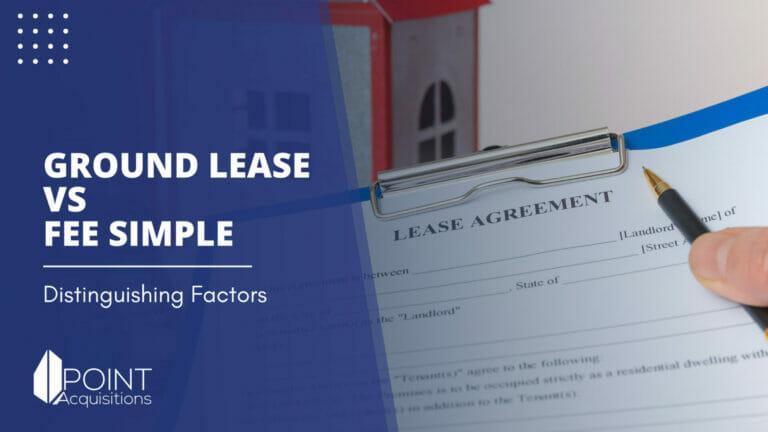
Ground Lease vs Fee Simple: What’s the Difference?
If you’ve ever looked into purchasing land or real estate. You’ve likely come across two complicated terms: ground lease vs fee simple. While both agreements involve the transfer of real estate from one party to another, there are key differences that you should be aware of before embarking on either.

Table of Contents
What is a Ground Lease?
A ground lease is an agreement between a tenant and a landlord that grants exclusive possession of the property for an extended period. The tenant has exclusive rights to use and occupy the property for a specific purpose, such as operating a business or building a building. With a ground lease, the tenant pays rent for land use – ground rent, but does not own it.
This arrangement offers tenants more flexibility because they can modify or terminate their lease at any time. It also allows landlords to retain control over their property while receiving rental income.
What is Fee Simple?
Fee simple is another real estate agreement in which an individual purchases ownership of the land and all its improvements. This means they are free to make changes to the property without obtaining permission from anyone else.
It also means that they will be responsible for any taxes associated with the property and any repairs or upkeep that needs to be done. In most cases, buyers who opt for fee-simple ownership will enjoy greater financial stability than those who choose a ground lease agreement.
Ground Lease vs Fee Simple
After reading the explanations above, it likely begs the question – what are the benefits and potential dangers of fee simple ownership versus a ground lease? Let us explore these two different structures in further detail.

Risks and Benefits of Each Structure
Ground Lease:
Risks – Since you are not the property owner, your rights to use and occupy the land may be limited. Additionally, rent payments may increase over time as landlords adjust for inflation or market fluctuations.
Benefits – A ground lease offers more flexibility than simple fee ownership. It allows tenants to terminate their leases at any time. This makes it ideal for short-term projects or businesses that may move locations in the future.
Fee Simple:
Risks – When you own a property outright, you are solely responsible for maintaining and paying taxes. You are fully liable for the property since it belongs to you.
Benefits – With fee simple ownership, you have complete control over your property. You can modify or sell it as you see fit.
When deciding which option is best for your situation, consider the risks and benefits of each one. A ground lease may be the better choice for short-term projects since it offers more flexibility. However, if you plan to own the property for a longer period of time, fee simple ownership is likely the wiser decision.

Why Investors Need to Understand the Difference
Investors looking to buy or rent property need to understand the difference between fee simple and ground lease agreements. Fee simple agreements allow investors to take full ownership of a property. At the same time, ground leases give them the right to use the property for an agreed-upon period at a negotiated rate. In both cases, investors need to understand their rights, obligations, and responsibilities related to each type of agreement to make an informed decision.
Summary & Conclusion
Fee simple and ground lease agreements are different structures for buying or renting real estate. Fee simple ownership allows an individual to buy outright ownership of the land and its improvements. Whereas, a ground lease gives a tenant exclusive rights to use and occupy the property for a specific purpose, time and at a negotiated rate.
When deciding which agreement best suits their needs, investors should consider the risks and benefits associated with each one. A ground leased property may be more suitable for short-term projects due to its flexibility. However, fee simple ownership often provides more financial security for long-term investments.
Ultimately, investors need to understand the difference between these two types of agreements to make the most informed decision. Doing so can help ensure that they get the best possible value for their money while protecting their financial interests in the long run.
Interested in Learning More?
As one of the nation’s foremost private equity commercial real estate investment firms, Point Acquisitions is dedicated to uncovering world-class multi-tenanted assets at prices below their true worth. Our mission is to generate exceptional risk-adjusted returns for our investors over time and contribute economically sound investments in our communities.
If you want to learn more about our commercial real estate investment opportunities, contact us at 866-543-7354 or info@pointacquisitions.com for more information.
About The Author

Jesse Shemesh
Disclaimer
Please note that Point Acquisitions is not a tax expert or tax advisor. The information on our blogs and pages is for general informational purposes only and should not be relied upon as legal, tax, or accounting advice. Any information provided does not constitute professional advice or create an attorney-client or any other professional relationship. We recommend that you consult with your tax advisor or seek professional advice before making any decisions based on the information provided on our blogs and pages. Point Acquisitions is not responsible for any actions taken based on the information provided on our blogs and pages.
1031 Exchange Capital Gains Tax Deferral
According to a 2021 report by the National Real Estate Exchange Services (RES), over 240,000 1031 exchange transactions were completed in the United States, totaling $100 billion. This impressive figure underscores the role of 1031 exchanges in the real estate…
Read More1031 Exchange Benefits
As of Q4 2023, the national vacancy rate for all commercial property types in the United States sat at 9.2%, according to CBRE’s latest insights and research. This represents a slight decrease compared to the previous quarter and suggests a…
Read MoreUnderstanding Commercial Property Value
The art of commercial real estate valuation is a critical skill in an industry teeming with over $1 trillion in yearly transactions. Our detailed guide on how to value commercial property is designed to elevate your expertise and give you…
Read More

